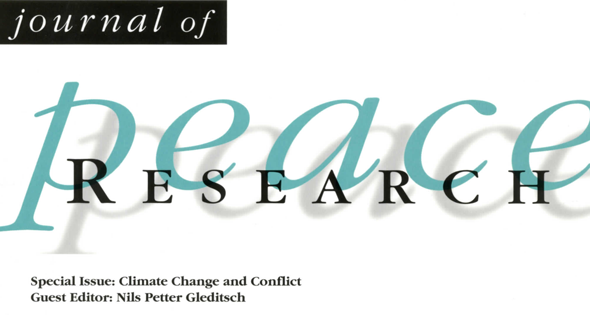-
Responses to JPR Climate and Conflict Special Issue: John O’Loughlin, Andrew M. Linke, Frank Witmer (University of Colorado, Boulder)

Complexity, in terms of economic, cultural, institutional, and ecological characteristics, weighs heavily on contemporary attempts to unravel the climate change/variability and conflict nexus. The view that local-level complexity can be “controlled away” by technical fixes or adding variables in quantitative analysis does not sit well with many geographers (though some do try to adopt a middle ground position).
Geographers are typically hesitant to make broad claims and sweeping generalizations across varied temporal and spatial spans; we stress the role of context in shaping particular outcomes. In an effort that most human and political geographers should certainly appreciate, many of the studies featured in this special issue of the Journal of Peace Research illustrate a determination to move toward finer resolution analysis than the nation-state scale. Further, when an association is uncovered, it is accompanied by silent caveats. These by no means nullify the findings of the respective articles, instead they suggest caution of simplistic interpretations in any direction (positive, negative, or null).
Recognizing the effects that varying definitions and regional foci have on conclusions that might be drawn from the cumulative body of research is important.
For example, conflict data definitions vary within the special issue – relationships are found for “social conflict” (Saleyhan and Hendrix) and when a distinction is made between “rebel” and “communal” conflicts (Raleigh and Kniveton). Some of the research includes analyses of civil war events, which is not necessarily the type of conflict that one would expect to see in the wake of ecological change.
Additionally, regardless of a study’s individual contributions, there will be concerns about external validity of single-country case studies (e.g. Kenya or Mali).
It is also a little surprising that not a single climate-conflict analysis in the special issue is based on survey data. The extent to which individuals are involved in conflicts is a function of personal- and local-level circumstances. Survey analysis is used increasingly in post- and ongoing-war zones to probe conflict experiences, reconciliation attitudes, and adaptations (e.g. in the Russian North Caucasus).
Area data analysis – whether grid cells, towns or villages, or sub-national administrative units – is limited, but it is often the best option for aggregating geographic information systems data from multiple sources (media reported and crowd-sourced conflict event data, climate and census data, or remotely-sensed environmental imagery).
In this broader spectrum of climate and conflict studies, there is much leverage to be gained from data collection and innovative estimation models using surveys of individuals and households across a variety of geographic contexts.
The issue marks a sort of mid-term stock-taking of the current state of research on possible climate-conflict links but the field has a long way to progress in terms of regional coverage, disciplinary approaches, nuanced and detailed climate measures, public outreach, and policy recommendations.
Further responses from the environment and security community on the special issue can be found here. If you’re interested in weighing in please feel free in the comments below.
John O’Loughlin is a professor of geography at the Institute of Behavioral Science, University of Colorado, Boulder. Andrew M. Linke is a PhD student in geography and a research assistant and Frank Witmer is a post-doctoral research associate.
 A Publication of the Stimson Center.
A Publication of the Stimson Center.



